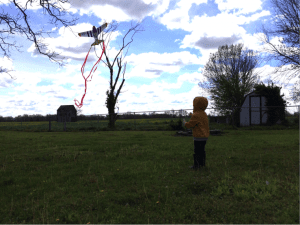The Fellows Journal is a forum for the current Library Publishing Coalition fellows to share their experiences and raise topics for discussion within the community. Learn more about the Fellowship Program.

It is an honor to have been named in the second cohort of Library Publishing Coalition Fellows. I thank the community and its leadership for welcoming me, and providing structure and support. In this blogpost, I will introduce myself, my history, and my professional interests.
***
Best Predictor of Future Behavior
Our campus held a celebration of first-generation students a few weeks ago. A colleague on his way there stopped by and asked if I was first gen. I replied that I wasn’t. There is a bit of further nuance to that, which feels appropriate for me to reflect upon here. No, both of my parents attended college, and in fact both held master’s degrees. It was an incredible privilege to grow up in a home where the idea of higher education was not shrouded in mystique, and I don’t know that I ever independently questioned how tuition would be paid for. I suppose it came up, but never in a way that actually made me feel any real concern. Again, just an incredible privilege.
My upbringing could easily have been much different. I was born in South Korea to extremely young parents, who I recently discovered did not complete high school. When I was put up for adoption, I’ve always assumed the decision must have been largely related to financial concerns. The records show I have an older brother, who was not put up for adoption. Had I been firstborn, I would likely be living in Korea now, presumably engaged in some sort of occupation that would seem foreign to the person I became. Instead, I was raised in Louisville, Kentucky, in a solidly middle-class home, raised by white parents that were firmly married, employed, and socially connected. As I told my work colleague, no, I am not a first-generation college student, at least not technically.
With that part of my story established, let me expose another bit of nuance. Both of my American parents have been wheelchair-bound since childhood. My father, a son of Louisville, caught the poliovirus as a child. His mother had been a nurse who administered doses of the polio vaccine to students in his elementary school. To her regret, she did not vaccinate her son, because of the age cutoff. My mother, a daughter of Cincinnati, had a tumor growth on her spine; the surgeon assigned to her was drunk during the removal operation. My parents met each other at the University of Illinois, which was one of the more handicap-friendly institutions in the region at that time. Perhaps it’s the same for everybody, but it has always felt true for me that who I am today has largely been contingent upon serendipity.
How Quickly We Forget
These are things that rarely cross my mind anymore. I’ve lived in a college town in peaceful, rural Western Kentucky for almost 18 years now. Since 2016, I’ve been employed as a tenure-track scholarly communication librarian and assistant professor. My ethnicity, adoption, and parents’ wheelchairs no longer count among the top ten salient factors of my waking consciousness. Though it takes a painful long time for my family to load in and out of our van, it’s because I have three children who need help buckling in, not two parents who need extra time to strap in. When my wife is asked when she “got” her children, the factual answer is “upon birth” and not some date related to paperwork.
I am spilling guts here because I have realized how I have forgotten these things in recent years. It has been incredibly easy to forget both the privileges I grew up with and those I recently gained. In their use of this LPC platform, past Fellows Charlotte Roh and Reggie Raju have reminded me of my privileges. From what I understand, the work Talea Anderson has planned will do so as well.
My Fellow Fellows
From an external view, my road to scholarly communication was perfectly serene. As Reggie discussed in his introductory blog, he was born the son of indentured labourers, transplanted from India to apartheid-era South Africa. While I put in work to get where I am personally and professionally, the situational challenges I faced were a couple orders of magnitude simpler than had I not been the second born to my family in Korea.
At the 2019 Fellows Forum, Charlotte Roh live-streamed her presentation from home. Roh aptly concluded her talk on personal and professional intersections by revealing her (beautiful) newborn baby under her care. At times, I have wondered how much more productive my research output could be without the sleep deficits that accompany co-raising my three young children. That’s a pretty crude thought for me to have, considering the overall health of our family and the herculean efforts my wife puts in as a mother. In truth, I wouldn’t have a career at all without my immediate and extended familial support networks.
As I’ve become acquainted with Talea, I’ve come to know of her interests in web accessibility. In his twenties, my father served on the public transit board in Louisville, where he had a major impact on accessibility for wheelchaired people in the city. For a decade, I’ve luxuriated in my ability to move freely about in both physical and digital spaces. The intent of Talea’s projects seem to be akin to those of my father’s: advocating independence for those not secured it.
The concerns of Reggie, Charlotte, and Talea are not quite at the forefront of my research agenda. But thanks to them, and the experience afforded to me through this Fellowship, the blips these topics make on my radar are increasingly audible.

For Future Research
Let me now return to the ‘introductory’ purpose of this post, and discuss what I hope to bring to the table. The research areas I hope I can help initiate conversation on in the LPC community are open peer-review, open citation data, research assessment reform, and AI/machine learning in research. Open infrastructure and the Latin American publishing model are heavily on my mind as well. I’ve previously written about (and not abandoned) novel methods of introducing students to scholcomm concepts. (I may have a future blogpost in me, critical of my own work, tbh.) Earlier this year, I was wowed by Kathleen Fitzpatrick’s book Generous Thinking, on reconnecting the work of the academy with the community, which has helped inspire my planned future research writing project, centering around methods to make published research not just more accessible, but more comprehensible to public audiences.
It Could All Be Symposium
As part of my Fellowship, I will serve on the Forum Program Committee. At Murray State University, I coordinate two campus-wide student conferences and one statewide conference annually. (I also oversee a student-led journal, and assist with three faculty-led journals.) I’ve come to view conference planning as not dissimilar to managing a journal. As a community, we’re quite familiar with wrongdoing in scholarly publishing. We’ve also grown in our shared public awareness of wrongdoing in scholarly conferences.
Discourse on conferences has become a trending topic, at least in my feeds. Whether it’s been the harm directed toward our Hathcocks, the harm emanating from our Tennants, or the harms we disagree on as harms, it is no longer an option for us to ignore these. How we handle these as conference participants and organizers must be tackled. I am eager to be further conscious of and conversant in these topics, plus many others. To wit: enforcing mic usage at Q&As; making it more of a question than a comment (I’m guilty); slide accessibility; getting the bathroom sitch in order; considerations of alcohol and animal protein in catering; land acknowledgements; and carbon and currency costs of conference travel. I don’t purport to have the answers, but I am coming to learn that asking the questions is a healthy and vital practice.
***
Thank you for reading.
Image Credit: Suzy Hazelwood, 2018.
